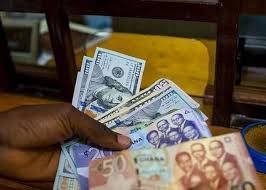Cedi Depreciates Further, Trades at GHS16.00 to $1 on Forex Market
The Ghanaian cedi has depreciated further against the United States dollar, with the currency said to be trading at GHS16.00 per $1 on the forex market on April 1, 2025, as opposed to the average official exchange rate of GHS15.84 per $1. It is a further drop in the value of the currency, indicating sustained economic pressures.
Increased Demand for Dollars and Economic Pressures
The fall of the cedi is mainly due to high demand for the dollar, fueled by issues like import dependency, external debt servicing, and low foreign direct investment. The local currency has been under pressure from the high demand for foreign exchange, compelling it to depreciate further.
Ghana's economy has experienced several setbacks in recent months, such as inflationary pressures and lowered investor confidence. The decline of the cedi spells doom for the increasing cost of living, as imports are now more costly, triggering inflation.
Comparison with Previous Rates
Data from currency tracking sites shows that the cedi was trading at around GHS15.50 to $1 in late March before slight appreciation to GHS15.51 on April 2, 2025ã€48】. The latest jump to GHS16.00 to $1 on the forex market shows the exchange rate volatility and the struggle Ghana's monetary authorities are having to stabilize the currency.
Comparison with earlier rates in 2025 indicates a continued weakening trend. In February, the rate of exchange was approximately GHS15.50 to $1, while in early January it was approximately GHS14.68 to $1ã€46】ã€47】. This indicates a steady decline, suggesting that fundamental structural economic issues continue to influence the currency's performance.
Impact on Businesses and Consumers
The depreciation of the cedi has direct effects on households and businesses. Importers, especially those dealing in essential commodities such as fuel, pharmaceuticals, and food, will pay more, and this is most likely to be passed on to consumers. This can further worsen inflation, which has been a major concern for the country.
For businesses that utilize imported raw materials, the production cost will rise, and this could lead to increased prices for locally produced items. Additionally, the rising exchange rate could further heighten pressure on fuel prices as petroleum products are tied to the dollar exchange rate.
Government and Bank of Ghana's Response
The Bank of Ghana (BoG) has implemented several measures to stabilize the cedi, including tightening monetary policies and increasing interest rates. These have not been enough, however, to halt the currency's depreciation. The central bank has also been injecting dollars into the market to support the cedi, but demand is still ahead of supply.
The government has appealed to individuals and businesses to reduce the use of foreign currencies and encourage local production to ease pressure on the cedi. However, in an import-dependent economy, reducing the demand for foreign currency is easier said than done.
Outlook for the Cedi
Economic experts foresee the cedi depreciating further if external financial inflows, including foreign investments and remittances, do not pick up. Although Ghana has experienced some improvement in external funding, there are still worries regarding debt servicing and macroeconomic stability.
The performance of the cedi in the next few months will be determined by the performance of global commodity prices, foreign investment inflows, and the capacity of the government to undertake economic reforms. Barring heavy intervention, the currency is likely to maintain its slide, subjecting the economy to further strain.
Conclusion
The depreciation of the cedi to GHS16.00 to $1 on the foreign exchange market mirrors Ghana's current economic woes. Increased demand for the dollar, inflation, and reliance on imports are pushing the fall, with traders and consumers bearing the brunt. Although the government and BoG have instituted policies to stabilize the currency, additional policies might be necessary to avert further depreciation.
Meanwhile, households and businesses will need to brace themselves for higher costs, as authorities move to introduce measures to restore confidence in the cedi.



No comments yet
Be the first to share your thoughts!